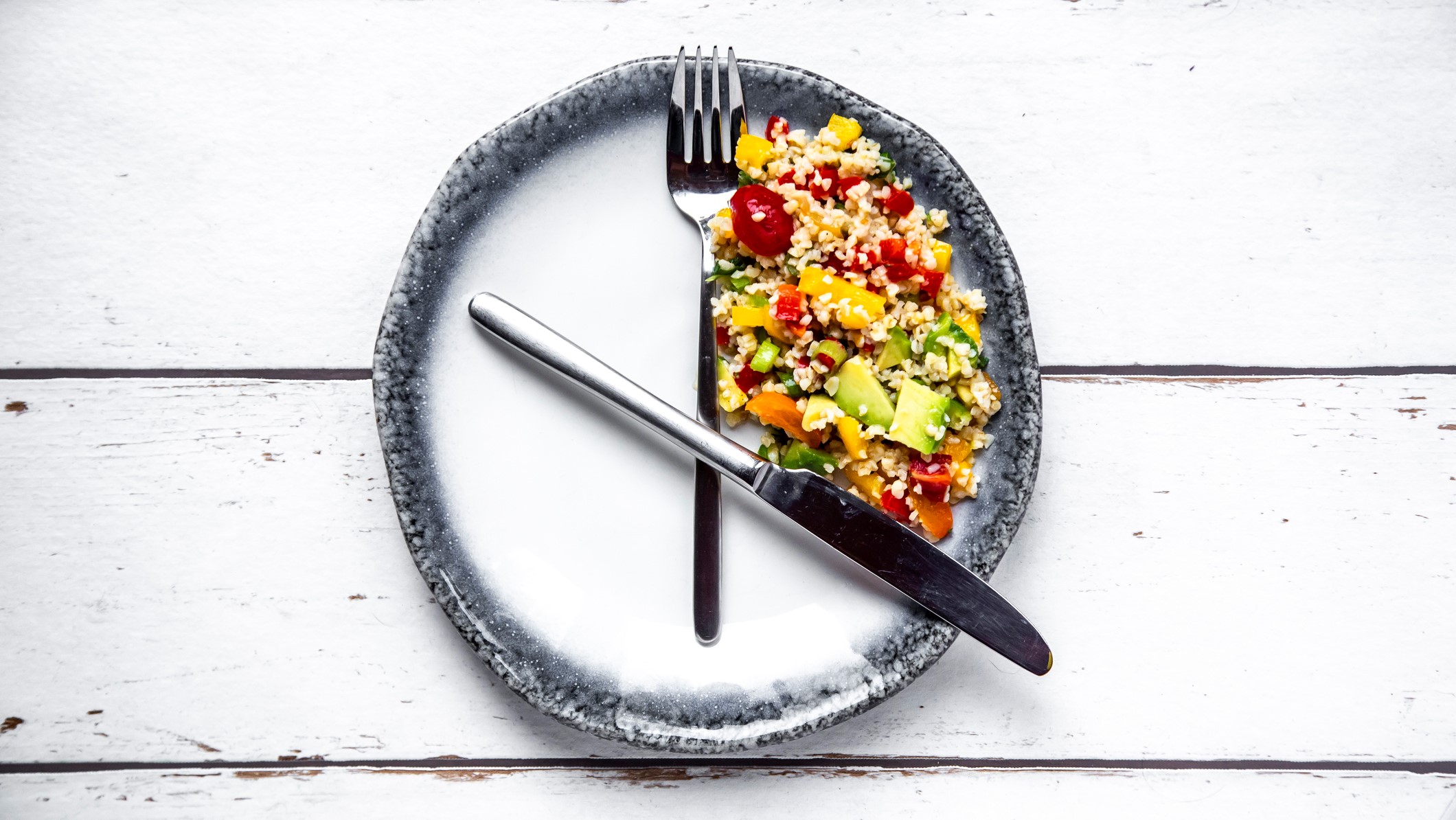The 5:2 diet: it requires willpower but can be powerfully effective
The 5:2 diet is an intermittent fasting plan that some say lets you have your cake, eat it AND lose weight


Get all the latest news, reviews, deals and buying guides on gorgeous tech, home and active products from the T3 experts
You are now subscribed
Your newsletter sign-up was successful
The 5:2 diet is a popular intermittent fasting plan that focuses on fasting for two days a week, while eating a ‘normal’ diet for five days a week. It's a very handy way to avoid weight gain at home, during lockdown. As with all diets, there are a few variations of the 5:2 diet, particularly when it comes to how many calories you eat on your fast days, and what foods you should or shouldn’t eat on your days off. It's a good way to Get fit in 2020.
- The Keto diet: why you should try it and how it helps weight loss
- The Military diet: how does it work and can it order you to lose weight?
- The vegan diet: plant-based living
What is intermittent fasting?
The term intermittent fasting refers to meal plans that revolve around regulated, periods of eating and then not eating, and there are several ways you can use intermittent fasting for weight loss. The most popular variations of intermittent fasting are the 5:2 and the 16:8 diets. On the 16:8 diet you only eat during an eight hour period, and therefore fast for 16 hours a day (obviously, the period when you are asleep is included in this, which helps a tad.)
What is the 5:2 diet and how does it work?
The 5:2 diet applies the principle of intermittent fasting to days, rather than hours, and so you fast for two out of every seven days. It works by significantly restricting your calorie intake on those days, which means your overall calorie intake is lower, providing that you don’t compensate and eat more than usual on your off days.
The original 5:2 diet plan, popularised by the Doctor and journalist Michael Mosley, recommends that on fast days women should consume 500 calories and men should consume 600 calories, which equates to roughly 25% of their normal recommended daily intake.
Since the publication of Mosley's first 5:2 diet plan, The Fast Diet, in 2013, variations have arisen, including from Moseley himself. His most recently-revised plan, published as the blood sugar diet because of the benefits of intermittent fasting on blood sugar levels – we’ll touch on this later – recommends eating no more than 800 calories on fast days.

What foods are allowed and what foods should be avoided?
One thing that makes the 5:2 diet so popular is that in theory you can eat whatever you want on your 'off' days. It's true that no food is off limits and you don't have to totally deny yourself the foods you love. However, it’s important to be aware that what you eat on your 'off' days will impact your weight loss.
While the 5:2 diet only requires you to restrict and count calories for two days a week, naturally the better you eat on your 'off' days, the more likely you are to a significant amount of weight. If you’re looking to lose weight fast you’ll need to be reasonably strict on your 'off' days and follow a Mediterranean diet on the non-fasting days.
Get all the latest news, reviews, deals and buying guides on gorgeous tech, home and active products from the T3 experts
If, however, you’re looking for a sustainable diet that will help you lose weight and keep it off long term, then you can expect to lose around 1lb a week by fasting for two days and eating normally for five.
So what should you eat on your fast days? It’s important to choose nutrient-dense foods that will fill you up more, making the calories you consume work harder for you. Vegetables, eggs, fish, lean meat and natural, unsweetened yogurt and are all good choices.

Benefits of intermittent fasting and the 5:2 diet
The most obvious benefit of intermittent fasting is weight loss, because of the restriction on calorie intake. Whatever you eat, weight loss essentially comes down to calories in versus calories out: also known as your calorie deficit. In short, if you consume more calories than you burn in a day, the excess energy will be stored as fat. If, however, you burn more calories than you consume, your body will start to take energy from your stored fat, resulting in weight loss.
As well as this, intermittent fasting also benefits our blood sugar levels. When we fast – whether that’s not eating or eating less – the insulin levels in our blood drops. Insulin is used by our cells to absorb sugar from the food we eat, so without insulin the cells are less able to use sugar for energy and so the rate of fat oxidation increases. Fat oxidation simply means when fat molecules are combined with oxygen to provide energy – it’s what you or I would call burning.
What's more, some studies have shown that intermittent fasting helps you to lose fat without losing muscle, because fasting increases the level of human growth hormone in your body which in turn helps build muscle mass.

5:2 versus 16:8: which intermittent fasting diet is better for me?
The main difference between the 5:2 and 16:8 diets is the period of time for which you fast. On the 5:2 you fast for two days out of seven, but fasting is defined as consuming 500 - 600 calories. On the 16:8 you fast for just 16 hours at a time, but this means you consume nothing but water during the fast period.
Importantly, the weight loss principle is the same for both diets. By restricting your calorie intake for an extending period of time – 16 hours or 24 hours – your body runs out of carbohydrate to burn and instead begins to burn fat for energy.
Because neither diet restricts what you can eat, which one will work better for you comes down to lifestyle more than the diet itself. For people who have a regular routine around which they can plan meals, or who prefer not to eat early in the morning or late in the evening, the 16:8 diet is arguably easier to follow than the 5:2. On the other hand, the 16:8 requires you to fast every day, whereas the 5:2 only requires it two days a week.
What's more, the 5:2 is more likely to have a positive impact on your overall eating habits. People who normally skip breakfast and eat dinner around 7pm may find themselves accidentally following the 16:8 diet (providing they don't snack after their last meal). This could mean they don't make any conscious changes to what they eat. It's very unlikely that anyone's normal diet limits them to 500 - 600 calories, and so with the 5:2 there has to be a conscious effort to adapt your diet and make healthier choices. We think that's a good thing if you're serious about losing weight well and keeping it off.
What the users say: does the 5:2 diet work?
Some users have found that it takes a little while for the weight loss to kick start, but nevertheless, the 5:2 diet works: "Initially there were two weeks when nothing happened, but after four weeks I started to lose weight," says Jackie, who began the 5:2 diet in January 2018.
Before starting the 5:2 diet Jackie weighed 9 stone 6 lbs, which put her towards the top end of the healthy weight range for her height and age. She wanted to lose half a stone on the diet, but ended up losing 1 stone 3 lbs in around five months.
"The 5:2 diet made me think more about what I was eating and how much I was eating on my 'off' days. While I didn’t give anything up, I did reduce my portion sizes, particularly when it came to treats like cheese and cake. I found that fairly easy to do," says Jackie. So eating cheese and cake is compatible with losing weight? It seems so.
What Jackie found hardest was getting into the routine of cooking the lunchtime meals suggested in Mosley's book, and instead she found herself eating easier to prepare but less satisfying lunches like a sandwich made from one piece of bread. "I was always relieved to get to the end of the second fast day. Not so much because I was hungry, but because of the thought that the next day I could have things I really wanted - just not in great portions," she says.
As well as the necessity of good meal prep, users not surprisingly note that following the 5:2 diet requires willpower in order to overcome hunger on fast days. Other side effects include tiredness and low energy levels, and so it’s vital that you speak to a healthcare professional before starting the 5:2 diet if you are at all concerned about your health, are pregnant or have previously suffered from an eating disorder.
Want to keep track of your progress?
